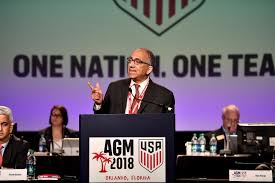By Andrew Warshaw
March 20 – Officials from the United States, Mexico and Canada have played down the possibility of anti-American sentiment among fellow FIFA members as they step on the gas in their bid to host the 2026 World Cup.
The triple-headed bid has long been viewed as the favourite to stage the tournament though untimely comments from US President Donald Trump have been met with irritation in several African and Middle Eastern countries. Then there is the FIFA-gate scandal orchestrated by US justice authorities who exposed systemic corruption.
But speaking to reporters in a conference call on Monday, United States Soccer Federation chief Carlos Cordeiro, one of three co-chairs of the bid, said he did not believe any of this would hurt the North American bid or be a factor in the vote on June 13.
“We believe strongly that this decision will be made on its merits,” said Cordeiro. “This is not geopolitics, we’re talking about football and what is fundamentally, at the end of the day, the best interest of football and our footballing community… We’ve had no backlash.”
United 2026 bid officials have been in Kuala Lumpur meeting key Asian Football Confederation members, a grouping considered pivotal in the race to beat off Morocco’s challenge.
“We are focused on our bid and what we have to offer and we believe the FIFA community will make their decisions based on the merits of our bid,” said Cordeiro. “We are being met with open arms and great enthusiasm by all member associations that we meet.”
In a strategic move designed to promote inclusivity, the North American bid recently reshuffled its leadership to make Cordeiro, Canada Soccer Association president Steve Reed and Mexican Football Federation chief Decio de Maria joint co-chairmen, replacing former USSF president Sunil Gulati, who had held the job on his own.
“We feel that with support and everything else we’re getting from all three governments at the federal level, it was only appropriate that all three of us chair this bid,” explained Cordeiro.
Before Kuala Lumpur, bid officials were in Colombia at the FIFA Council meeting, then moved on Peru to meet with South American football leaders. Before that, they were lobbying in Jordan, Switzerland and in southern Africa.
“There’s nothing better than face-to-face talks with each president of each federation,” de Maria said.
With past World Cup bidding shenanigans in mind, Cordeiro noted that all of the United 2026 campaign meetings have been held “in a very open, transparent way” and that FIFA knew about every gathering. “Our vision is a very simple one. We offer FIFA an unprecedented united opportunity to stage the 2026 World Cup. We believe strongly that this decision will be made on its merits.”
Much has been made about the decision to hand 60 games to the United States if they win the bid – including all knockout games from the quarter-finals onwards – with Canada and Mexico 10 games each. But Cordeiro said all three co-chairmen were comfortable with the proposed split.
“When we came together more than a year go, we decided that this was the most optimal mix of cities and matches based on what the three countries together had available and were ready to offer FIFA,” he said. “We certainly are coming to that discussion with a common point of view, but ultimately that decision will be made by FIFA if we’re awarded the bid.”
Canada’s case to host more games has taken something of a hit since Vancouver, arguably the country’s most internationally popular city and which happens to be Reed’s home town, withdrew from the running. Reed admitted it wasn’t an ideal move.
Asked if he was disappointed, Reed commented: “Yes, to be perfectly honest. I would be disappointed, in that it’s my back yard and I’ve lived there for most of my life.”
Contact the writer of this story at moc.l1745178515labto1745178515ofdlr1745178515owedi1745178515sni@w1745178515ahsra1745178515w.wer1745178515dna1745178515

